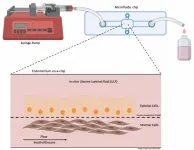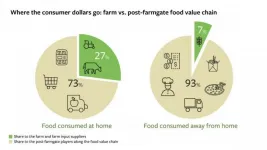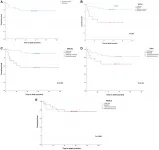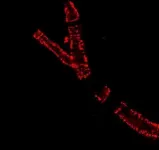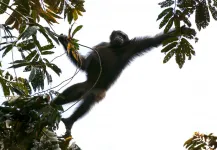Researchers discover how cowpea mosaic plant virus activates immune system against cancer
Immunology researchers led by Dartmouth and Dartmouth-Hitchcock's Norris Cotton Cancer Center discover how the cowpea mosaic plant virus is recognized by and strongly stimulates the immune system to attack and often eliminate cancerous tumors
2021-06-07
(Press-News.org) LEBANON, NH - Previous work by a team of researchers led by Steven N. Fiering, PhD, Immunology and Cancer Immunotherapy researcher at Dartmouth's and Dartmouth-Hitchcock's Norris Cotton Cancer Center and Nicole Steinmetz, PhD, Jacobs School of Engineering and Moores Cancer Center, University of California San Diego, showed that a plant virus that does not infect mammals, cowpea mosaic plant virus (CPMV), when injected into cancerous tumors, strongly stimulated the immune system to attack and often eliminate the tumor. However, very little was understood about immune recognition of plant viruses and how and why CPMV is exceptionally immuno-stimulating. In a new study, the team identifies just how CPMV is recognized by the immune system, opening the door for CPMV to be pursued as a new biological drug for treatment of cancer.
CPMV is recognized by the immune system as a pathogen--any infectious agent that can cause disease--through a family of receptors on immune cells called toll-like receptors. Toll-like receptors recognize molecules that signal the invasion of a pathogen and send a warning signal to the immune cells to mobilize to attack the pathogen. When tumors are injected with CPMV, the immune system activates and attacks the tumors by way of this pathogen pattern recognition. "The recognition of CPMV by toll-like receptors illustrates how these receptors are quite flexible and recognize many more molecular patterns than immunologists previously knew," says Fiering.
During the immune stimulation process, the immune cells release proteins that signal and activate other immune cells, known as cytokines. The team's study, "Cowpea mosaic virus stimulates antitumor immunity through recognition by multiple MYD88-dependent toll-like receptors," newly published in Biomaterials, identifies the three toll-like receptors that recognize CPMV. The paper also highlights the importance of a particular cytokine, "interferon alpha," for strong anti-tumor impact when used as an in situ vaccine to treat cancer.
In situ vaccination, in which tumors are directly treated with immune stimulating reagents, have powerful potential to improve cancer immunotherapy in a safe and inexpensive manner. "In situ vaccination has made contributions already to cancer treatment. CPMV is an excellent reagent that may soon be used to help patients in the same manner," says Fiering. "The in situ vaccination treatment of a tumor by CPMV can stimulate the immune system to also attack distant metastatic tumors that have not been treated."
INFORMATION:
Commercial development of CPMV as a biological drug for the treatment of cancer in the form of in situ vaccination is in progress by Mosaic ImmunoEngineering Inc., a biotech company co-founded by Steinmetz and Fiering with a team of scientists and entrepreneurs. The company has licensed the rights to this technology and is actively pursuing bringing it to the clinic for the direct benefit of patients.
Phase I trials of CPMV in situ vaccination in humans are planned to start in late 2021 or early 2022.
Steven N. Fiering, PhD, is a Professor of Microbiology and Immunology at the Geisel School of Medicine at Dartmouth, and a member of the Immunology and Cancer Immunotherapy Research Program at Dartmouth's and Dartmouth-Hitchcock's Norris Cotton Cancer Center. His research interests include developing clinically useful in situ vaccination approaches to generate therapeutic anti-tumor immunity.
About Norris Cotton Cancer Center
Norris Cotton Cancer Center, located on the campus of Dartmouth-Hitchcock Medical Center (DHMC) in Lebanon, NH, combines advanced cancer research at Dartmouth College's Geisel School of Medicine in Hanover, NH with the highest level of high-quality, innovative, personalized, and compassionate patient-centered cancer care at DHMC, as well as at regional, multi-disciplinary locations and partner hospitals throughout NH and VT. NCCC is one of only 51 centers nationwide to earn the National Cancer Institute's prestigious "Comprehensive Cancer Center" designation, the result of an outstanding collaboration between DHMC, New Hampshire's only academic medical center, and Dartmouth College. Now entering its fifth decade, NCCC remains committed to excellence, outreach and education, and strives to prevent and cure cancer, enhance survivorship and to promote cancer health equity through its pioneering interdisciplinary research. Each year the NCCC schedules 61,000 appointments seeing nearly 4,000 newly diagnosed patients, and currently offers its patients more than 100 active clinical trials.
About Dartmouth-Hitchcock Health
Dartmouth-Hitchcock Health (D-HH), New Hampshire's only academic health system and the state's largest private employer, serves a population of 1.9 million across northern New England. D-H provides access to more than 2,000 providers in almost every area of medicine, delivering care at its flagship hospital, Dartmouth-Hitchcock Medical Center (DHMC) in Lebanon, NH. DHMC was named again in 2020 as the #1 hospital in New Hampshire by U.S. News & World Report, and recognized for high performance in 9 clinical specialties and procedures. Dartmouth-Hitchcock also includes the Norris Cotton Cancer Center, one of only 51 NCI-designated Comprehensive Cancer Centers in the nation; the Children's Hospital at Dartmouth-Hitchcock, the state's only children's hospital; affiliated member hospitals in Lebanon, Keene, and New London, NH, and Windsor, VT, and Visiting Nurse and Hospice for Vermont and New Hampshire; and 24 Dartmouth-Hitchcock clinics that provide ambulatory services across New Hampshire and Vermont. The D-H system trains nearly 400 residents and fellows annually, and performs world-class research, in partnership with the Geisel School of Medicine at Dartmouth and the White River Junction VA Medical Center in White River Junction, VT.
[Attachments] See images for this press release:

ELSE PRESS RELEASES FROM THIS DATE:
2021-06-07
Extreme risk protection orders (ERPOs), also known as gun violence restraining orders, are civil court orders that grant temporary restrictions on purchasing and possessing firearms for individuals determined by a civil court judge to be at extreme risk of committing violence against themselves or others. A new study examined ERPO use in Oregon in the first 15 months after it was adopted. The study found that while ERPOs are commonly considered as a tool to remove guns from dangerous individuals, they should also be considered as a tool to prevent gun purchases by dangerous individuals.
The study was conducted by researchers at Michigan State University (MSU), Columbia University, the University of Michigan, and Johns Hopkins University. It appears in ...
2021-06-07
The threat of antibiotic resistance rises as bacteria continue to evolve to foil even the most powerful modern drug treatments. By 2050, antibiotic resistant-bacteria threaten to claim more than 10 million lives as existing therapies prove ineffective.
Bacteriophage, or "phage," have become a new source of hope against growing antibiotic resistance. Ignored for decades by western science, phages have become the subject of increasing research attention due to their capability to infect and kill bacterial threats.
A new project led by University of California San Diego Biological Sciences graduate ...
2021-06-07
To investigate factors that can jeopardize pregnancy success in cattle, researchers at the University of São Paulo (USP) in Brazil used a kind of chip to mimic the environment of the endometrium, the tissue that lines the inside of the uterus.
The study was conducted by biologist Tiago Henrique Camara de Bem, a postdoctoral fellow at the University of São Paulo's School of Animal Science and Food Engineering (FZEA-USP), in collaboration with four researchers at the University of Leeds in the UK. Their findings are reported in an article in the journal Endocrinology.
The researchers focused on analyzing alterations in levels of insulin and glucose in maternal ...
2021-06-07
CAMBRIDGE, MA -- About 60 percent of drugs on the market have hydrophobic molecules as their active ingredients. These drugs, which are not soluble in water, can be difficult to formulate into tablets because they need to be broken down into very small crystals in order to be absorbed by the human body.
A team of MIT chemical engineers has now devised a simpler process for incorporating hydrophobic drugs into tablets or other drug formulations such as capsules and thin films. Their technique, which involves creating an emulsion of the drug and then crystallizing it, allows for a more powerful dose to be loaded per tablet.
"This is very important because if we can achieve high drug loading, it means that we can ...
2021-06-07
ITHACA, N.Y. - As soon as an ear of corn is taken off its stalk or a potato is pulled from the ground, it travels anywhere from a few miles to across continents and sometimes undergoes processes that transform it into the food we consume.
These miles and processes contribute to what's known as the food value chain (FVC), along which, as one might expect, the value of the product increases. However, most of the research and attention thus far paid to FVCs occurs at the ends of the chain - inside the farm gate and at the consumer's plate.
Less is understood about all of the other links in the FVC, in part due to a lack of ...
2021-06-07
Oncotarget published "Landscape of somatic mutations in breast cancer: new opportunities for targeted therapies in Saudi Arabian patients" which reported that the association between genetic polymorphisms in tumor suppressor genes and the risk of BCa has been studied in many ethnic populations with conflicting conclusions while Arab females and Saudi Arabian studies are still lacking.
The authors screened a cohort of Saudi BCa patients by NGS using a bespoke gene panel to clarify the genetic landscape of this population, correlating and assessing genetic ...
2021-06-07
In the quest for healthy aging and longer lifespan, Danish researchers at the University of Southern Denmark have collaborated with Swedish researchers at Karolinska Institutet to explore the anti-aging effects of football and team handball training in women.
In a current study published in Scientific Reports, the researchers investigated the effects of lifelong regular exercise on two of the central hallmarks of aging combined and showed that football and team handball have a positive effect on telomere length and mitochondrial function in women.
"Our legacy consists of DNA that is packed in chromosomes. When cells divide, the inheritance is copied, but with each cell division the ends of the DNA threads get shorter. The so-called telomeres are shortened, which causes us to age. ...
2021-06-07
High blood pressure, or hypertension, is the leading modifiable risk factor for cardiovascular diseases and premature death worldwide. And key to treating patients with conditions ranging from chest pain to stroke is understanding the intricacies of how the cells around arteries and other blood vessels work to control blood pressure. While the importance of metals like potassium and calcium in this process are known, a new discovery about a critical and underappreciated role of another metal - zinc - offers a potential new pathway for therapies to treat hypertension.
The study results were published recently in Nature Communications.
All the body's functions depend on arteries channeling oxygen-rich ...
2021-06-07
The COVID-19 pandemic continues to disrupt and end lives around the world, and public health officials worldwide have recognized vaccines as the critical tools required for controlling the COVID-19 death toll and achieving a return to normal life. Several vaccines against COVID-19 are already in use, but the limited supplies of these vaccines and the possibility of safety and efficacy issues of the existing vaccines mean that it is important for scientists to develop more (and even better) vaccines. In fact, as of February 2021, 69 different vaccines are in various phases of clinical development.
One type of vaccine that could prove quite useful is the inactivated vaccine, which contains an inactivated form of the virus. The inactivated virus cannot harm the recipient, but ...
2021-06-07
A new study published in the journal Diversity and Distributions predicts massive range declines of Africa's great apes - gorillas, chimpanzees and bonobos - due to the impacts of climate change, land-use changes and human population growth.
For their analysis, the authors compiled information on African ape occurrence held in the IUCN SSC A.P.E.S. database, a repository that includes a remarkable amount of information on population status, threats and conservation for several hundred sites, collected over 20 years.
The first-of-its-kind study quantifies the joint effects of climate, land-use, and human population changes across African ape ranges for the year ...
LAST 30 PRESS RELEASES:
[Press-News.org] Researchers discover how cowpea mosaic plant virus activates immune system against cancer
Immunology researchers led by Dartmouth and Dartmouth-Hitchcock's Norris Cotton Cancer Center discover how the cowpea mosaic plant virus is recognized by and strongly stimulates the immune system to attack and often eliminate cancerous tumors


